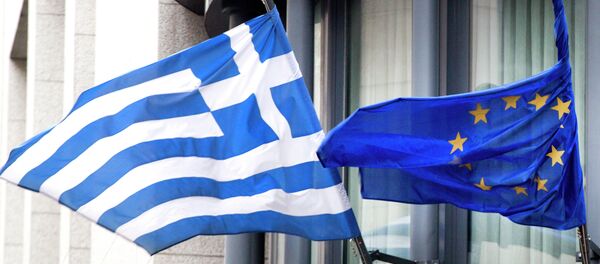Following the breakdown of Thursday's Eurogroup meeting, Greek Prime Minister Alexis Tsipras, German Chancellor Angela Merkel and French President Francois Hollande all agreed to hold an emergency summit after the weekend in an attempt to reach a deal.
The @EUCouncil has set up web page for Mon #eurozone summit on #Greece. Not much there yet tho http://t.co/ObFmPuzhyN pic.twitter.com/Uh8X83u2GM
— Peter Spiegel (@SpiegelPeter) June 19, 2015
This follows a meeting between Alexis Tsipras and Russian President Vladimir Putin, after the Greek PM traveled to Russia to attend an economic forum in St. Petersburg.
Goodbye #EU, Hello #BRICS? Tsipras meets Putin on Friday http://t.co/AfFJvRoU1h via @DiddleySquatt pic.twitter.com/Lv0oq7YsuQ
— Marcel Sardo (@marcelsardo) June 18, 2015
Speaking exclusively to Sputnik, Stefanos Samoilis, Syriza member of the Parliamentary Committee on Economic Affairs said efforts in the past few months have been completely centered on reaching an agreement with its European partners.
However, according to Austrian Finance Minister Hans Jorg Schelling, "we don't know if Greece is going to make a move and make new proposals."
"Taking this to the political level, as Greece does, is obviously a double-edged sword," Schelling added.
2 sr officials who participated in #eurogroup meeting have confirmed to me @Reuters report @ecb worried #Greece banks may not open Monday
— Peter Spiegel (@SpiegelPeter) June 18, 2015
Greek savers pulled more than 1 billion euros from banks in one day on Thursday @Reuters #Grexit #Greece #oil pic.twitter.com/7F1t1Yi8vQ
— Christopher Johnson (@chris1reuters) June 19, 2015
"This has been an honest effort from our government to avoid any one-sided decisions that would lead to unknown results. However, as I have stated before, a default is not something we need to avoid at any cost.
"Our priority is to reach an agreement that is in the interest of the working majority and not to extend their problems by pretending the only solution is to sign a new memorandum continuing along the lines of austerity."
Stefanos Samoilis, however, ruled out an Icelandic model of default and nationalization of the banking system.
"I don't think this would be something that is suitable for Greek situation. Iceland's problems were mostly — if not completely — centered on their banking system. In that sense I think that they made the right choice of defaulting and nationalizing their banks.
While everyone is talking about Greece do not forget about #Iceland pic.twitter.com/qbH6GV9reD
— *Russian Market (@russian_market) June 19, 2015
@wmiddelkoop greece does an iceland, not a cyprus. question could be is greece the new ukraine or the next iceland?
— Rico Brouwer (@ricobrouwer) June 18, 2015
"To a certain degree most developed countries around the world helped their banks after the financial meltdown with taxpayer's money while at the same time they acquired control over their managerial boards.
Stefanos Samoilis told Sputnik that one of the party's main promises and political directions is for more public control over the banking system."In our case however, Greek taxpayers payed for the insolvency and recapitalization of their banks without getting anything in return. This, I think, is the biggest scandal in Greek Banking history."
"Especially when we paid to capitalize them," Samoilis said.
"Furthermore, the unwillingness of the banks to play a developmental role and provide sufficient liquidity has hurt the Greek economy and can only be reversed if national control is applied. This doesn't have to be in the form of nationalizing the whole banking system but at a minimum we need a publicly owned bank that aims to provide funding opportunities based on the common good.
Samoilis explained that depending on the outcome of further negotiations, the Greek government will explore the possibility of nationalizing the banking system or creating a public bank.
Responding to the rhetoric that a Grexit would be suicidal for Greece, Samoilis told Sputnik: "I don't agree with this view. I don't think anything other than the continuation of austerity policies, is suicidal for Greece.
"A Grexit I think is much more painful for the European Monetary Union than for any single nation's economy."
Nice chart showing collapse of banking system in Greece H/t @Schuldensuehner pic.twitter.com/9WIKNezHtb
— MineForNothing (@minefornothing) June 19, 2015
"The current talks with our partners will determine whether Greece will keep on making decisions based on an irrational economic model which will bring even more people to the brink of poverty, further diffuse our social security system for the profit of big interests, or whether Europe and Greece will change course and provide a democratic and sustainable solution for the profit of the many.
"If we see that our partners insist on unsustainable policies, it is our duty to explore other options provide them to the Greek public and democratically decide which way to go forward.
Grexit will be beginning of end of eurozone, says Tsipras http://t.co/MZerkH8yCK
— Dangote News (@dangotenews) June 19, 2015
"The debt problem has to be resolved if Greece aims to seriously return to growth. In the past few months many concessions have been made by the Syriza government in favor of an agreement with our European partners. One that hasn't been made is about the debt. I personally disagree with some of the concessions made such as the privatization of the peripheral airports and these are topics we are discussing and we will evaluate if/when an agreement is reached.
"However a concession on the Greek debt problem is something that must not happen if we aim to find a permanent solution and not just another short term fix.
Greece is taking a bitter pill from Germany. Portugal, Italy, Spain, Ireland, France, Austria, Poland, Latvia wait. pic.twitter.com/L83rz8l0t2
— *Russian Market (@russian_market) June 19, 2015
"The fact that Europe is now officially discussing the Greek Debt problem when only a couple months ago it was out of the table is proof of what a democratically elected left wing party can achieve in opposition to what we are told," claimed Samoilis.
"We will negotiate until the last minute, Peter Altmaier, Angela Merkel's chief of staff told Inforadio saying that he still believed it was possible that Athens and its international leaders could reach a solution to Greece's debt crisis.
European countries spend the week celebrating imperialism and then wonder why collaborations for wider good #eu #euro fail miserably #Grexit
— Jordan_dby (@jordy81) June 19, 2015
Greece has until the 30th June to agree a deal to prevent the country defaulting on its 1.6 billion euro debt to the International Monetary Fund and becoming bankrupt.





